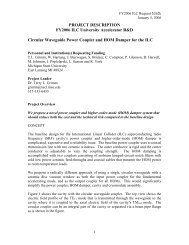order denying motions to suppress and dismiss - University of Illinois ...
order denying motions to suppress and dismiss - University of Illinois ...
order denying motions to suppress and dismiss - University of Illinois ...
- No tags were found...
You also want an ePaper? Increase the reach of your titles
YUMPU automatically turns print PDFs into web optimized ePapers that Google loves.
1<br />
2<br />
3<br />
4<br />
5<br />
6<br />
7<br />
8<br />
9<br />
10<br />
11<br />
12<br />
13<br />
14<br />
15<br />
16<br />
17<br />
18<br />
19<br />
20<br />
21<br />
22<br />
23<br />
24<br />
25<br />
26<br />
27<br />
28<br />
<strong>of</strong>ficers <strong>and</strong> agents were entering <strong>to</strong> arrest the defendant.<br />
The Ninth Circuit held the entry <strong>and</strong> the subsequent arrest <strong>of</strong> the defendant<br />
(Phillips) were invalid because the agents did not have probable cause <strong>to</strong> believe<br />
the defendant was in his <strong>of</strong>fice at the time <strong>of</strong> the raid. Id. at 1136. “An agent must<br />
have probable cause <strong>to</strong> believe that the person he is attempting <strong>to</strong> arrest, with or<br />
without a warrant, is in a particular building at the time in question before that<br />
agent can legitimately enter the building by ruse or any other means.” Id.<br />
th<br />
Recently, Bosse was cited in U.S. v. Alverez-Tejeda, 491 F.3d 1013 (9 Cir.<br />
2007), a case in which federal Drug Enforcement Agents employed an elaborate<br />
ruse <strong>to</strong> seize an au<strong>to</strong>mobile. It was undisputed that the DEA agents had the right<br />
<strong>to</strong> seize the car without a warrant. The agents had probable cause <strong>to</strong> believe the<br />
car had been used for carrying contrab<strong>and</strong> because they had purchased drugs from<br />
inside it as part <strong>of</strong> their investigation. They also had probable cause <strong>to</strong> believe the<br />
car was carrying contrab<strong>and</strong> on the day <strong>of</strong> the seizure based on several intercepted<br />
phone calls <strong>and</strong> direct surveillance. The only issue was the unorthodox method <strong>of</strong><br />
seizing the car. With regard <strong>to</strong> that method, the Ninth Circuit Court <strong>of</strong> Appeals<br />
held:<br />
Nor was there anything unreasonable in the agents’ choice<br />
<strong>of</strong> guile <strong>to</strong> seize the car, rather than taking it outright, as<br />
they were entitled <strong>to</strong> do. While we don’t generally secondguess<br />
the government’s use <strong>of</strong> stealth <strong>to</strong> ferret out criminal<br />
activity . . . we take a closer look when agents identify<br />
themselves as government <strong>of</strong>ficials but mislead suspects as<br />
<strong>to</strong> their purpose <strong>and</strong> authority. This because people “should<br />
be able <strong>to</strong> rely on [the] representations <strong>of</strong> government<br />
<strong>of</strong>ficials. United States v. Bosse, 898 F.2d 113, 115 (9 th<br />
Cir. 1990)(per curiam)(internal quotation marks omitted).<br />
If people can’t trust the representations <strong>of</strong> the government<br />
<strong>of</strong>ficials, the phrase “I’m from the government <strong>and</strong> I’m<br />
here <strong>to</strong> help” will become even more terrifying.<br />
This concern is at its zenith when government <strong>of</strong>ficials<br />
lie in <strong>order</strong> <strong>to</strong> gain access <strong>to</strong> places <strong>and</strong> things they<br />
would otherwise have no legal authority <strong>to</strong> reach. . . .<br />
This consideration is not implicated by the agents’<br />
actions here because they already had the authority<br />
ORDER DENYING MOTIONS<br />
TO SUPPRESS AND DISMISS - 16


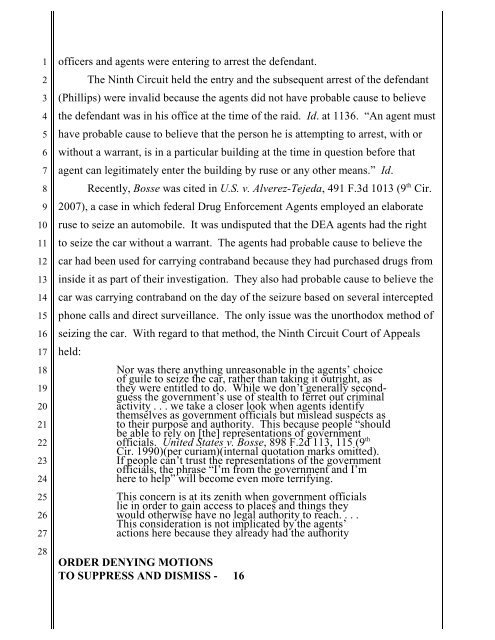
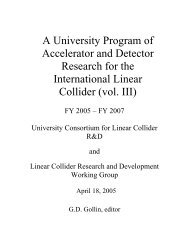
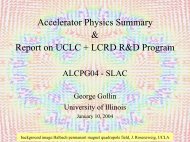
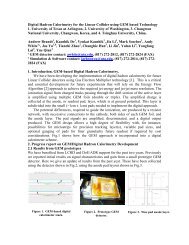

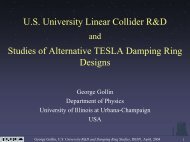
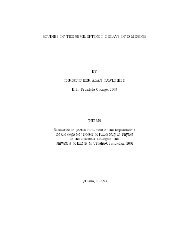
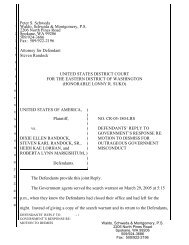

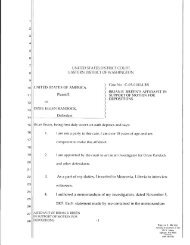
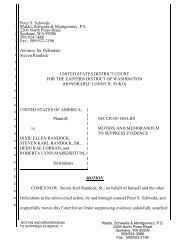
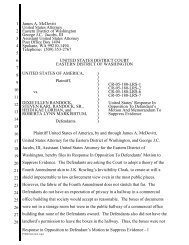
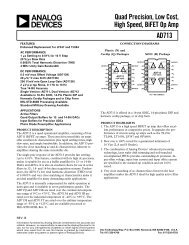
![Linear Collider [Accelerator] Overview](https://img.yumpu.com/33867705/1/190x143/linear-collider-accelerator-overview.jpg?quality=85)
